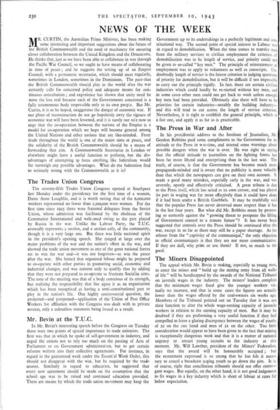The Trades Union Congress '
The seventy:fifth Trades Union Congress opened at Southport last Monday under the presidency for the first time of a woman, Dame Anne Loughlin, and it is worth noting that of the 6,000,000 workers represented no fewer than 1,200,000 were women. For the first time since 1925 there were fraternal delegates from the Soviet Union, whose admission was facilitated by the abolition of the Communist International and weloAned owing to the part played by Russia in the war. Unlike the Labour Party, the T.U.C. avowedly represents a section, and a section only, of the community, though it is a very large one. But there was little sectional spirit in the president's opening speech. She ranged at large over the major problems of the war and the nation's effort in the war, and showed the trade union movement as one of the great national forces set to win the war and—it was not forgotten—to win the peace after the war. She hinted that organised labour might be prepared to co-operate with other parties in promoting social, economic and industrial changes, and was content only to qualify that by adding that they were not prepared to co-operate to frustrate Socialist aims. The tone of the meeting was that of a body conscious of its strength, but realising the responsibility that lies upon it as an organisation
which has been recognised as having a semi-constitutional part to play in the nation's life. One highly controversial question, the projected—and postponed—application of the Union of Post Office Workers for affiliation with the Congress was dealt with in private session, only a colourless statement being issued as a result.


























 Previous page
Previous page